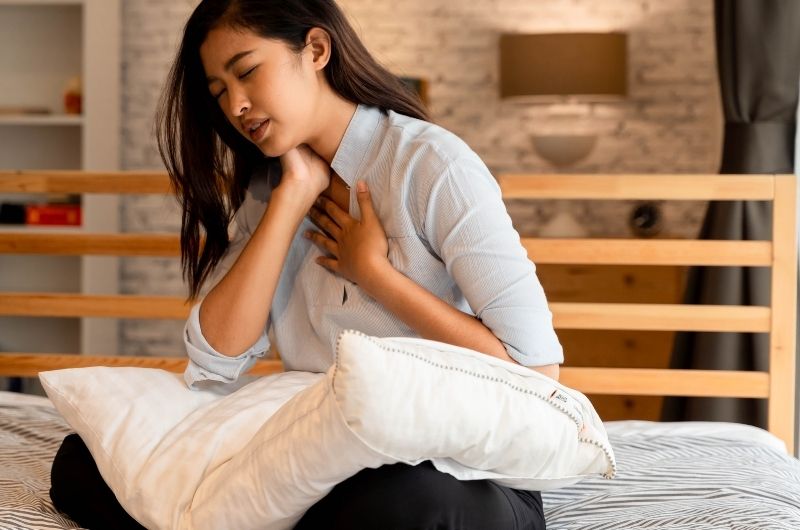Shortness of breath caused by anxiety may also be accompanied by other symptoms such as sweating, increased heart rate, and other possible signs. Our muscles tend to work harder as the fight or flight response is kicked in by fear. The increased heart rate then results in using up more oxygen, and our breathing can become erratic or cause breathlessness. There’re other signs of anxiety to recognize when they’re experiencing it. Various treatments include maintaining a journal about anxiety episodes and practicing breathing techniques accompanied by an improved daily routine can be practiced to reduce the chances of these attacks.
Shortness of breath isn’t an uncommon symptom of anxiety.
Still, it can be challenging to detect if this symptom is a cause of anxiety. One might also be short of breath because of walking at high altitudes, working out, tight clothing, or having a lifestyle without any activity.
Not being able to breathe properly isn’t a defining symptom of anxiety.
Though usually, the portrayal in media of anxiety is always shown as not being able to breathe and tightening of the chest, which isn’t always the case in real life.
Different people experience different signs or symptoms.
You can sometimes become confused if it’s because of an anxiety attack or your jeans were too tight today.
There’s a need to look at the identifying signs of anxiety.
What causes this shortness of breath, and how can you get rid of or prevent it?
Shortness of breath causing anxiety

Everyone experiences anxiety in their day-to-day life which is mostly good for you.
It brings out your fight or flight response, and you become more productive for that short period.
For example, when towards the end of an exam, only ten minutes are left to answer the remaining two questions, and anxiety kicks in to make you speed up.
But this anxiety can go into overdrive and become a hindrance to some people, further causing them to seek treatment.
Things become extreme that even the smallest of things can trigger an anxiety attack causing them to spiral down the pathway of fear and experience different symptoms.
Anxiety is a form of your body’s response to fear, and different people experience different symptoms.
Becoming irritable, wound-up, and not being able to concentrate are some signs, but shortness of breath is another defining symptom.
Those who suffer from this symptom will also feel:
- Shortness of breath or rapid breathing
- Increased heart rate
- Sweating
- Chest pain or tightening
- Feelings of impending doom
- Feeling of suffocation
- Feeling a lump in the throat
- Muscle tension
- Heart palpitations
- Feeling faint, dizzy, or unsteady
- Nausea or stomach discomfort
- Restlessness, irritability, or feeling on edge
The connection between shortness of breath and anxiety
When you go to the doctor, they first eliminate the reason for this shortness of breath by ruling out other possibilities which could have caused it, including breathing problems and heart issues.
But anxiety does have a connection with feeling breathless. When a person feels fear kicking in, anxiety sets in, which is triggered by the fight-or-flight response.
This leads to both behavioral and physiological changes.
As the heart increases to pump blood to the organs faster, to ready the muscles for action, which is a physical change it causes rapid breathing.
It provides more oxygen to the muscles and leads to feeling short of breath.
Fear kicks in when you’re followed by strange men on the street at night and also when you’re about to give a presentation at work.
Generalized anxiety disorder (GAD) affects 3.1 percent of people in the U.S. in any given year, and it’s more common in females than in men.
Other defining symptoms of anxiety
Feeling short of breath and related signs are not the only defining signs of going through anxiety. While you might feel breathless, you might not feel chest tightness or other associated symptoms.
It’s better to be aware of more typical signs one experiences when having an anxiety attack.
This is a wide range, and one needs to be informed of all symptoms of anxiety:
- Dry mouth
- Dizziness
- Chills
- Nausea
- Diarrhea
- Shaking
- Muscle tension
- A choking sensation
- Fear of losing control
- Agitation or feeling jittery
- Frightening thoughts or mental images
- Poor concentration
- Confusion
- Poor memory
- Difficulty speaking
One can feel breathlessness when experiencing GAD, but things can become worse with a panic attack.
It’s a much-advanced version of anxiety where things go out of control.
While anxiety attacks set in gradually but panic attacks are sudden and overwhelming.
People who suffer from it carry medicines with them or know the self-calming treatments. It can be severe enough to feel like you have a heart attack.
Treating shortness of breath from anxiety

Our mind is a powerful tool, and it can get a lot of things under control when you consciously make an effort and one such thing is your breathing.
Usually, breathing is the easiest thing we do in our day, which requires zero effort from us, and mostly we aren’t even conscious of it.
When experiencing anxiety, our chest might feel tight, and our heartbeat increases as our breath become erratic. But this conscious focus on breath is what can help you calm down.
It might seem impossible, but a few exercises can help you do so.
Getting your breathing under control can also help you calm down psychologically and get rid of anxiety.
Experts recommend practicing diaphragmatic breathing that’s done using your diaphragm by taking deep breaths.
Focusing on it can help you slow your breathing rate, decrease your oxygen demand, and use less effort and energy to breathe.
This exercise can be a lot of effort for someone experiencing anxiety initially.
You might even feel it’s useless as it doesn’t work instantly and requires conscious effort. But with more practice and help from close friends and family, you can work on it.
Ways to prevent feeling short of breath from anxiety

Of course, it can be impossible for a person who just started experiencing these symptoms to become a master at controlling these signs and feeling normal in a few minutes.
It takes effort and patience to know your triggers and how to control the signs and calm down your anxiety over the years.
With time, you get prepared for it beforehand. Whenever you’re in a situation that feels like a trigger, either you can get away from it or know how to handle it.
Maintaining a journal can help you where you can write what’s triggering your anxiety and what’s not.
What signs do you feel in an episode, and what did you do to calm it down?
You can write what you felt during that time, what triggered it, how severe it was, and when it occurred. This can also help your doctor diagnose the issue better.
Most people benefit from recording their episodes which helps them reflect on them after they have gone through them and find ways to deal with the episodes better the next time.
There’s no sure way but only by experiencing it and reflecting and observing yourself is the way to deal with it.
The biggest thing to accomplish is recognizing you’re going through something like this, which can prepare you in advance.
Anxiety relieving techniques
- Grounding techniques like clenching your body parts and slowly releasing them while focusing on your body’s sensation when you clench your body.
- Distract your mind by describing things around you, like the shape of the table in front of you, the things kept on it, and which color they look or how they feel when you touch them.
- One big help is trying to talk to yourself. If you have never talked to yourself, it might seem like a crazy idea but talking to yourself is a great thing. It makes you realize things you can do and take control of and is affirming overall. Talking to yourself when feeling breathless by saying why it’s occurring and how you can get it under control is affirming to your body and mind.
- When we’re stressed about a situation, we think of how liberating it would be to go on a run. It seems like a stupid idea at that time, but it came to you because that’s what your body is preparing itself to do. Going on a run isn’t a bad idea to calm your anxiety.
- Anxiety is all about sensations, and when your senses are overwhelmed, you can find ways to calm them down. Many people enjoy a relaxing scented bath or reading a book with peaceful music in the background. Or drinking tea to help them calm down.
- Shocking yourself can seem like another weird idea, but sometimes dipping your face in ice-cold water can calm your overwhelmed sensations and bring you back to the present moment.
Practicing mindful activities such as yoga and meditation can also help reduce the occurrence of anxiety attacks. Healthy eating and being moderately active can help achieve the same.
Working with a professional is more beneficial than tackling this issue independently. They are trained to provide you with the best treatment specialized for your current condition, including medication, cognitive behavioral therapy, psychotherapy, and relaxation methods.
When to see the doctor
Severe shortness of breath can also be confused with a heart attack and even with coronavirus.
The following symptoms are observed in a person experiencing a heart attack:
- Tightness or pain in the chest, neck, jaw, back, or arms
- Fatigue
- Light-headedness, nausea, or vomiting
- Discomfort in your arms or shoulder
- Sweating more than usual without a logical reason
FAQs
Does anxiety ever go away?
The usual anxiety people suffer in their daily lives isn’t anything to be worried about and is a healthy reaction of our bodies to cope with a fearful situation.
But when this becomes out of control can be termed as an anxiety disorder when it interferes with a person’s daily life.
Even the smallest of things might cause an anxiety attack, and it’s accompanied by several signs and symptoms.
It can be treated using breathing techniques, therapy, psychotherapy, and medications.
Over time, a person can know their triggers and how to handle them to better manage and reduce the number of attacks.
Is anxiety worse at night?
Anxiety can become worse for many people as night approaches.
It has to do with daily stressors, poor sleeping habits, and other health conditions that can trigger anxiety attacks.
But there are several ways to bring it under control by changing a few things in your routine to a more calming one.
It’s better to discuss your treatment options and coping mechanisms with a professional to see what works.
To summarise
When you feel breathlessness due to anxiety, it can feel like your world is crumbling under your feet. Everything becomes overwhelming as if you’re spiraling down the staircase.
The signs and symptoms could be physical and other psychological.
Someone experiencing it for the first time won’t know how to deal with it, but with time you can learn about your triggers and how to cope with them.
There’re various breathing and calming techniques and daily routines things which can make your life easier and reduce anxiety attacks.
Taking note of the possible symptoms is vital to recognize if it’s anxiety or something else.
Seeing a mental health professional can be quite beneficial to work through the cause behind your anxiety issues.


